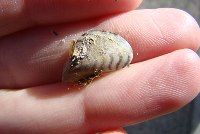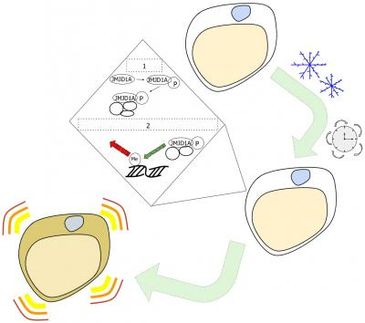Antibacterial agent could cause pregnancy problems
A chemical found in everything from antibacterial soaps and lotions to socks and toothpaste may disrupt an enzyme that plays an important role in pregnancy, University of Florida researchers say. Thought to be harmless, triclosan gives many soaps and lotions their antibacterial oomph and is found in hundreds of popular products. But a team of UF researchers led by Margaret O. James, Ph.D., has discovered that the chemical hinders an enzyme linked to the metabolism of estrogen. The researchers’ findings are reported in Environment International.
In pregnancy, this enzyme, called estrogen sulfotransferase, helps metabolize estrogen and move it through the placenta into the developing fetus. There, the estrogen plays a crucial role in brain development and the regulation of genes.
“We suspect that makes this substance dangerous in pregnancy if enough of the triclosan gets through to the placenta to affect the enzyme,” said James, a professor and chairwoman of medicinal chemistry in the UF College of Pharmacy. “We know for sure it is a very potent inhibitor. What we don’t know is the kinds of levels you would have to be exposed to to see a negative effect.
“We know it is a problem, but we don’t know how much of a problem. We need to move forward and do additional studies.”
In pregnancy, the placenta basically serves as a developing baby’s in-womb survival kit. Almost everything the fetus gets from its mother — namely food and oxygen — comes through the placenta. It also creates important hormones, such as progesterone and estrogen.
Aside from the role it plays in the fetus, estrogen also affects how much oxygen the baby gets from the mother, said Charles Wood, Ph.D., a professor and chairman of physiology and functional genomics in the UF College of Medicine and a co-author of the study. All of the oxygen a baby gets from its mother flows through the mother’s uterine artery. Without enough estrogen, this artery can constrict, decreasing blood flow.
“If you don’t make enough estrogen you can, we think, starve the baby of enough oxygen,” Wood said.
Estrogen is also involved in signaling the uterus to contract during labor. But maintaining the right levels of the hormone during pregnancy is a delicate balance, Wood says. Too much estrogen could send the mother’s body into premature labor. Too little could hinder the flow of oxygen. Both instances could affect how the baby’s brain develops.
This is one of the reasons scientists are concerned about the pregnancy-related effects of chemicals such as triclosan.
“Some of these (chemicals) can go and combine with estrogen receptors and mimic estrogen or keep estrogen off its receptors or change the metabolism of estrogen, which is what we are looking at with triclosan,” Wood said.
In April 2010, the Food and Drug Administration decided to take a closer look at triclosan after several studies found links to problems with hormone regulation and other possible negative health effects. Other studies have shown that the chemical, which cannot be broken down by bacteria, stays in the environment long after it is used.
“Triclosan is a material that is present in the environment and everyone has low levels. If you use products with triclosan, you will likely have higher levels,” said Bruce Hammock, Ph.D., a professor of entomology at the University of California-Davis who studies triclosan. “It has some real benefits but it is certainly not risk-free.”
More studies are needed before researchers can conclude what effects triclosan really has on human health, James said.
“The triclosan is incorporated into household products because it inhibits bacterial growth,” James said. “But the bad thing is it has this unexpected side effect of inhibiting this important enzyme in the body. At this point we don’t know if the levels people are exposed to are high enough to cause an adverse effect.”























































